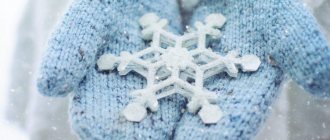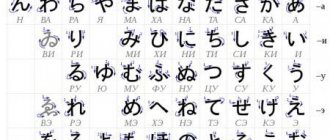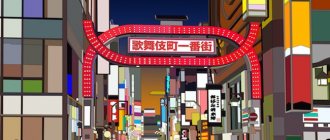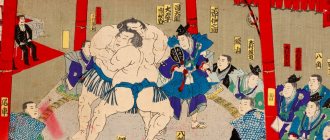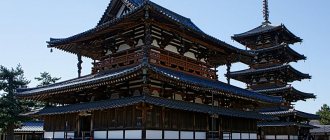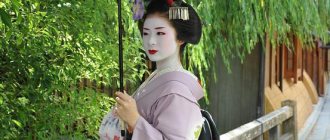Most people are probably unfamiliar with the word triskaidekaphobia, although everyone has encountered the phenomenon it denotes. We are talking about a morbid fear of the number 13, which is common among people of Western Christian culture and is explained by religious prejudices.
East Asia has its own religions and traditions, and they give rise to their own superstitions. One of them is tetraphobia, that is, an irrational fear of the number 4. This phenomenon is most widespread in China, Korea and Japan.
Why don't people like the number 4 in Japan?
In Japanese, the number 4 sounds like “si”, “shi”. This is consonant with the word " death ". Therefore, everything containing a four is considered unlucky. In addition, all even numbers are considered unlucky and bad.
This is not to say that the number 4 does not exist in Japan or that it is prohibited. It is used, but with caution. This is reflected in the local mentality, culture and life, for example:
- You won't be able to buy a tea ceremony set for four people;
- In multi-storey buildings, after the 3rd floor there is the 5th or 3-A;
- There is no 4th ward in hospitals.
Numbering in a Japanese elevator without 1, 4, 13, 14 floors
Japan
Let me remind you that simplified hieroglyphs of Japanese numbers from 1 to 9 look like this:
One of the unluckiest numbers is “4” (四). There are no rooms with this number in the hospital; in houses they prefer to exclude the 4th floor (the third is followed by the fifth).
Chinese/Japanese character for "four"
A short digression about reading Japanese characters . It is obvious that the Japanese had spoken language long before written language. According to the generally accepted version, Chinese characters came to Japan thanks to Buddhist monks from the Korean kingdom of Baekje, who brought Chinese texts in Chinese to Japan in the 5th century AD. Japanese characters have the so-called on reading (on'yomi) and kun reading (kun'yomi).
Onyomi , or Chinese reading, is a Sino-Japanese reading, i.e. Japanese interpretation of the Chinese pronunciation of the character or, in other words, the Chinese reading of the character in question adapted to Japanese speech.
Kun'yomi , or Japanese reading, is Japanese reading because... it is based on the pronunciation of native Japanese words, to which Chinese characters were selected according to their meaning.
Hieroglyph "path"
Example. The character 道 in Chinese sounded something like [dao]. In Japanese speech it acquired the sound [do]. Thus, [do] is the onic reading of the character 道 in Japanese. The Japanese began to use this kanji (borrowed Chinese character) to represent the word path. Initially, even before the advent of writing in Japan, they already had the word path in their oral speech, it is read as [miti], i.e. [michi] is the kun reading of the character 道 in Japanese.
Let's get back to reading the numbers in Japan. Onny (Japaneseized Chinese) reading of the number “4”, [si], lat. [shi], is reminiscent of the character 死 (“death”), which has the same reading.
Hieroglyph "death"
Another number (figure) with a negative connotation among the Japanese is nine. The reason also lies in “bad” consonance. The number “9” (九) unlucky by the Japanese due to its consonance with the hieroglyph “torment” (“pain”). This kind of consonance itself, or the game of reading numbers, is called “goroawase” in Japan.
See also: Incomprehensible India: some good advice for travelers
Hieroglyph "nine"
Examples of "unlucky" two-digit numbers in Japan:
24 - ni-si (二死): “double death”;
33 - san-zan (散々): “unfortunate”; “cruel, terrible”;
42 - si-ni (死に): “to death”;
49 - si-ku (死苦): “death throes.”
In Japan, odd numbers are generally considered lucky. In particular, the following are considered happy: “3” (三), “5” (五), “7” (七).
Hieroglyphs "three", "five", "seven"
Continuing the conversation about odd numbers: when in Japan, when congratulating newlyweds, they give money, they usually give an odd number of bills. The highest denomination banknote in modern Japan is 10,000 yen. An odd number of such notes (1, 3, 5, etc.) will thus give 10,000 yen, 30,000 yen, 50,000 yen, etc. Among the Japanese, it is believed that an even number is inconvenient for a wedding: since an even number can be divided in half without a remainder, such an even amount can lead young spouses to a quarrel.
Hieroglyph "eight"
The even number “8” (八) especially lucky On the one hand, the image of this character (八) resembles an opening fan (“suehirogari”), which, in turn, has the figurative meaning of “going up.” On the other hand, the number eight in the usual European notation is the infinity symbol (“∞”) turned 90°.
On the Japanese island of Honshu there is a city called Nagoya - the 4th largest city in all of Japan. The emblem of Nagoya is a character (八) (“eight”) enclosed in a circle:
This emblem, approved in October 1907, symbolizes the endless development and prosperity of Nagoya.
The Japanese usually associate lucky seven (“ 7 the 7 Japanese gods of happiness :
- Daikoku (god of prosperity and farmers - a large bag of treasures over his shoulder, and a magic mallet in his hands);
- Bishamon (god of war and warriors - dressed in armor, a helmet on his head, a sword in his hands);
- Ebisu (god of fishermen and prosperity - holding a huge red carp and a fishing rod);
- Fukurokuju (god of longevity - he is distinguished by an elongated head);
- Juro:jin (another god of longevity - with a long gray beard, wears a school cap; often depicted with a deer - his messenger);
- Hotei (god of happiness - cheerful and pot-bellied);
- Benzaiten (goddess of music - with a mandolin in her hands).
This is how these Japanese gods of happiness are depicted:
In Japan, there are 7 spring herbs that are eaten together with rice porridge: Japanese parsley, shepherd's purse, cucumber, chickweed, chickweed, turnip, and rezuha. It is believed that these 7 herbs expel evil from the body and protect a person from diseases.
See also: The most beautiful male actors of Soviet cinema
There are also 7 autumn herbs: Japanese clover, beetroot, patrinia, Chinese sapling, cloves, sugar cane, arrowroot. They are not eaten, but are used as decoration during the September full moon celebrations.
Conclusion:
Lucky numbers in Japan: “8”, “3”, “5”, “7”. “4” and “9” unlucky numbers in Japan
New anti-fashion
Recently, there has been a trend towards triskaidekaphobia (fear of the number 13) in Japan. This is due to the fact that the number 13 was promoted by the media, in cinema, music, and computer games. Many Japanese are not just afraid, but afraid of him.
This resulted in 13 being used less frequently. For example, some buildings do not have such a floor, apartment, or office. Their number is either eliminated or replaced with 12-A or 12-B. This is how landlords try to attract customers.
The computer game Friday the 13th, which influenced the mentality of many Japanese
Terrifying number 0888888888
Nowadays, people endow even telephone numbers with magical properties. One of the terrifying stories involves the number 0888888888, which belonged to the Bulgarian mobile communications company Mobitel. History says that none of the three owners of this number survived.
The first person to die from the curse of the mysterious telephone number was the chief director of the company itself, Vladimir Grashnov. The second person to suffer from the magic of the cursed numbers was drug lord Konstantin Dimitrov. The last victim was also a dealer in prohibited goods, Konstantin Dishiliev.
After his death, the company decided not to sell the number anymore and it no longer had owners.
Interesting facts about Japanese unlucky numbers
In Japan, there is an urban legend about the “unknown caller.” It is believed that there is a certain mysterious person whose phone number consists of only fours. If he calls you and you pick up the phone, then some misfortune will certainly happen.
In Japanese culture, the number 43 is associated with stillbirth. It can cause a pregnant woman to give birth to a stillborn baby. That’s why there is no room 43 in maternity hospitals. And expectant mothers try to avoid it during pregnancy.
Not everyone is afraid of such combinations of numbers. For example, the Yakuza likes to use the number 4 and its combinations in car license plates. Thus, they emphasize their recklessness. And the number “4444” is considered a sign that the bandit does not care at all about the risk of death.
Japanese license plate with unlucky number 49
Japanese athletes are very superstitious. Therefore, they are not assigned the numbers 42 and 49. In sports, these numbers are associated not with death, but with defeat.
One day, the Canadian Telecommunications Commission decided to introduce an additional dialing code 474. But SaskTel approached them with a request to change it to 639. They were afraid of a drop in revenue due to the fact that Asians were afraid to call numbers with unlucky numbers.
In this article we talked about unlucky numbers in Japan and why people are afraid of them. We hope it was interesting. Don't forget to share it with your friends J
The mystical meaning of multi-digit numbers
The double-digit number 43 did not please the nation either. It is associated with the death of newborns. Expectant mothers try not to have anything to do with this number, and maternity hospitals number the wards without forty-third apartments. Anyone who has anything to do with sports competitions will never compete under the unlucky numbers 42 or 49. According to local superstitions, such athletes face the fate of taking last place.
Other combinations of tens and ones, as well as hundreds and thousands, also have an interesting sound. For example, 49 is pronounced “siku” - torment, bringing pain or death. 4256 sounds like “sini goro” and means that the time has come to leave this life. 33 is “sanzan”, a hieroglyph that translates as terrible, painful, sorrowful. Well, 24 can completely depress the Japanese, since it is interpreted as double death.
During wedding ceremonies, newlyweds are traditionally given an amount that is only represented in odd numbers on banknotes. A monetary gift, which can be divided among each other into equal shares, can serve as a bone of contention in a new family and simply quarrel between spouses.
Chinese numbers in characters
Like letters, numbers are represented by hieroglyphs in Chinese writing. For residents of European and American countries, this is an unusual system of symbols. In addition to the fact that you need to remember how they are correctly written and pronounced, take into account that in the Chinese language they cannot be inflected by cases, numbers, or genders.
You also need to remember that in China there are two types of numerals. The usual type (form) is used in the everyday life of the Chinese. Formal recording is used in official institutions: for example, in stores (checks). Numbers in formal notation are a more complicated version of symbols.
Four in classical Chinese culture
Remember:
The four cardinal directions are north, south, west and east;
Four seasons of the year - summer, winter, autumn and spring;
Four worthy activities of a noble person are playing a musical instrument, chess, calligraphy and drawing (we talked about this in the article about in);
The four great towers of China are Penlai, Yuyan, Tenwan and.
As you can see, the four is very popular in classical Chinese culture. It is also common in the religious sphere:
Four major texts in Taoism;
The Four Sacred Texts of Confucianism.
Number 39
The most unfavorable number in Afghanistan is considered to be 39. It is not entirely clear what exactly caused such strong fear of this number.
Most likely, the reason is that the sound of the number is similar to the phrase dead cow.
This is probably why people in this country don't like this number so much. The fear is so great that many try not to live in houses and apartments under this figure, and those who are currently 39 years old, when asked about their age, prefer to answer that they are one year less than 40.
Unlucky number 7
Although quite often in numerology the number 7 is regarded as positive, bringing good luck and happiness, not all countries agree with this statement. For example, sometimes seven is associated with death or anger.
The seventh month of the Chinese calendar is believed to be the month of spirits.
People are sure that during this time ghosts and spirits live among people. People's sincere belief in the supernatural makes them see terrifying signs even where there are none.
Thus, the Chinese believed that the crash of an Indian military aircraft and a Mi 171 helicopter of the Vietnamese army was not a simple matter.
Since in the first case exactly 7 passengers died (and it was a mysterious sign, but it’s not clear how to decipher it), and the second helicopter crashed on July 7.
The meaning of the number 4 in ancient Chinese culture
If you remember, the Chinese have a lot in common with this figure:
- directions: north, south, west, east;
- seasons: summer, winter, autumn, spring;
- the greatest Chinese inventions: paper production, magnetic compass, gunpowder, book printing technology;
- noble pursuits: music, chess, calligraphy, drawing;
- Chinese palaces: in Penglai, Yuyang, Tenwan, Yellow Crane Tower.
In spiritual life, the most revered are the “fours”:
- for Buddhists - indisputable truths;
- for followers of Tao - the main texts;
- for adherents of Confucius - sacred texts.
Number 26
The number 26 is read as negative or negative in India. Hindus really have many reasons for such superstition.
On January 26, 2001, an earthquake occurred that caused the death of more than 20,000 people. On December 26, 2004, a tsunami occurred in the Indian Ocean, which took the lives of 230,000 people.
On May 26, 2007, a series of explosions occurred in the city of Guwahativ. On July 26, 2008, a bomb was detonated in Ahmedabad and on November 26 of the same year, several terrorist attacks occurred in Mumbai.
